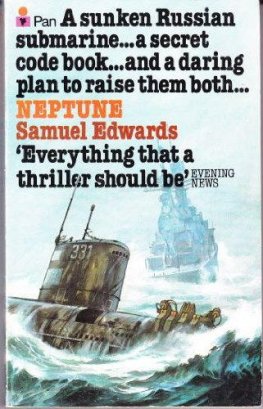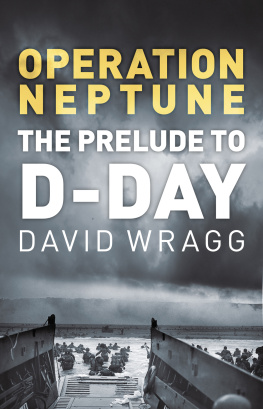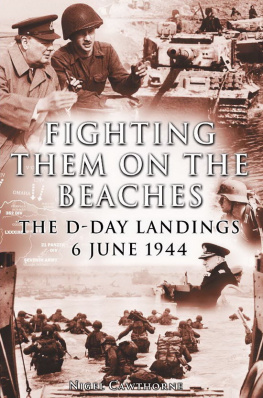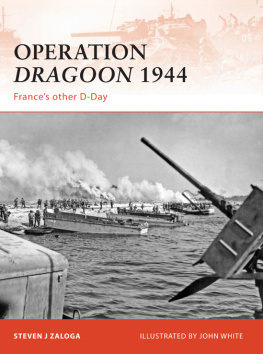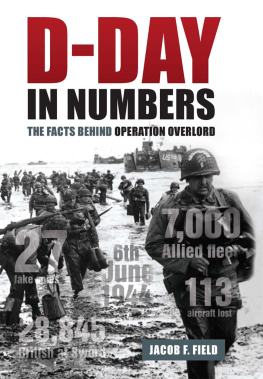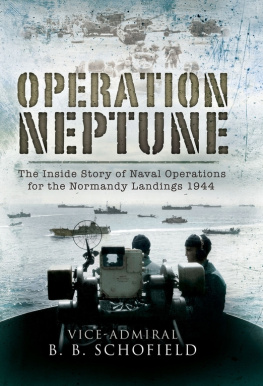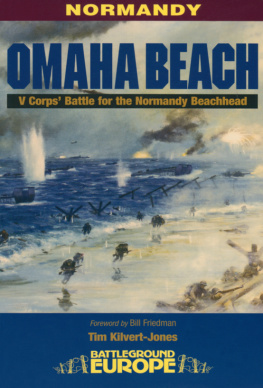A section of men that has just landed in Ruquet in St Laurent sur Mer, on the rocks along the shore of Omaha littered with abandoned equipment. To the right, a DUKW. The name was not an acronym; it came about from GMC terminology. D indicated a vehicle designed in 1942, U meant utility, K indicated driven by front wheels, W indicated two powered rear axles.
Omaha Beach, with reinforcements landing.
Fonthill Media Limited
Fonthill Media LLC
www.fonthillmedia.com
First published in the United Kingdom 1946
This revised edition first published 2013
British Library Cataloguing in Publication Data:
A catalogue record for this book is available from the British Library
Copyright The Estate of Commander Kenneth Edwards 2013
ISBN 978-1-78155-127-1 (PRINT)
ISBN 978-1-78155-379-4 (e-BOOK)
All rights reserved. No part of this publication may be reproduced, stored in a retrieval system or transmitted in any form or by any means, electronic, mechanical, photocopying, recording or otherwise, without prior permission in writing from Fonthill Media Limited
The original 1946 edition was dedicated by the Author to the Memory of Admiral Sir Bertram H. Ramsay, KCB, KBE, MVO. Allied Naval Commander, Expeditionary Force Who Wrought and Wielded Neptunes Trident
The 1946 edition had a small section of illustrations, most of which have been included in this edition. This full-illustrated 2013 edition has addition photographs and captions.
Typeset in 10/13 pt Sabon
Printed and bound in England
CONTENTS
The conception of invasionThree men of courageBattle of the Atlantic the keyThe Grand Strategy of ship-savingThe beginnings of Combined OperationsRaidsDieppeBuilding up experience.
The beginning of the planningEarly thoughts of invasion in the Pas de Calais areaPreliminary concentration on the MediterraneanChoice of site for invasion of Northern Francethe X Staffthe COSSAC PlanDecisions of the Quebec ConferenceAppointment of Admiral Ramsay.
First naval requirementsAdmiralty reactionsPossible German strengthGeneral Montgomery appointedHis requirement of a larger scale of assaultPlanning on the new basisAppointment of Rear-Admiral Sir Philip VianEver-increasing naval needs.
Landing craft productionalteration of ships and coastersPort facilities and hardsIdea and production of the Mulberry artificial harboursThe ferry serviceThe Gooseberry shelter harboursAdmiral Kirks appointment.
General Eisenhowers appointmentOne indivisible forceDetailed planningThe needs of an armyShip-loading problemsBuild-up and turn-round control organisationsThe need for simplificationThe convoy code.
Shortage of officersSpecial trainingThe Lochailort systemLessons of DieppeBombardment requirements and trainingRocket craftBombardment organisationAir spotters and weaversThe V Scheme for merchant seamen.
The repair organisationThe tug organisationRepair ships and repair partiesSurveying the French coastFinal planningBeach namesMisleading the enemy.
Assembly of the forcesObstacles dictate daylight assaultFinal exercisesPreliminary actionsThe British mining campaignThe minesweeping problem caused by the change of tideAnxiety about the weather.
Forecasts of deteriorating weatherThe operations room at Battle HeadquartersHistoric meetingsThe decision to postpone D-dayThe effect on ships at seaThe decision to invade on June 6th.
Midget submarines as light-shipsSweeping the assault channelsMinesweepers in sight of France before darkGerman inaction.
Preliminary bombardmentsNeutralising the German batteriesGood shootingThe German torpedo boats attackSupporting the Sixth Airborne Division Drenching the beaches with high explosiveGiving supporting fire.
The Germans keep their heads downThe first wave goes into the beachesThe Germans come to lifeClearing the obstaclesCasualties and damageThe Battle of Omaha beachThe Le Hamel strongpointGallantry and determinationBeach commandos.
Landing under fire in a seawayBattle for the Langrune-sur-Mer strongpointBattle for the Lion-sur-Mer chteauA long march through enemy-held territoryThe battle for Port-en-BessinThe struggle east of the River Orne.
Air attacks on the anchorageThe German mining offensiveKilling the U-boats before they could attackThe U-boats try the schnorkel.
Great work of the Light Coastal ForcesThe close blockade of Le HavreDaring actions under coastal gunsActions off the Dutch coastE-boats fail against a convoy.
Part of the merchant naviesThe critical periodConvoys through the Straits of DoverPlanting the Gooseberries and MulberriesCourseulles and Port-en-BessinThe great gale.
Effects of the galeSalvage and repairSWORD area abandonedGales effect on German mining campaignMaking good the loss in the Build-up.
Light coastal forces stop Cherbourg evacuationDutch coast actions against German reinforcementsRendezvous with U-boats and escorts off BrestActions off Le Havre.
Keeping the convoy system workingCommunicationsMeals and mailsCasualty notificationFurther build-upOperation Pluto.
The Support Squadron, Eastern FlankThe trout lineGerman human torpedoesBooby trapsExplosive motor boatsShelling the Germans.
Cruiser Division SevenClose range bombardmentThree hours of hot actionImportance of CherbourgWithdrawal of the Task Forces.
German strategy of holding and destroying portsThe Red Ball RouteClearing CherbourgHuman minesweepersMarseilles and AntwerpBrest.
Importance of Le HavreSuccessful actions by our patrols stop German attempts to reinforceGerman attempts at evacuation have to be abandonedFall of Le HavrePort clearance organizationDieppeBoulogneOstendAntwerp.
Three-fold assaultBad weather precludes air spotting and supportInitial bombardmentGreat fight of the Support SquadronDrawing the enemys fireWork of the CommandosDifficulty in landing supplies.
V weapons on AntwerpVon Rundstedts offensiveDeath of Admiral RamsayGerman midget U-boatsWatching, patrolling and raidingPlanting a Cuckoo on OverflakkeeRaiding SchouwenSecond battle for ArnhemThe crossing of the Rhine.
Scenes at the unconditional surrender of the Germans at Rheims and in Berlin.
FOREWORD
By Admiral Sir Harold Burrough, K.C.B., K.B.E., D.S.O.
Allied Naval Commander, Expeditionary Force
It is a tragedy that Admiral Sir Bertram Ramsay did not live to see this book in print, with the foreword written by himself. I will not attempt to enlarge on the story given here of the conception, the planning and the execution of this great adventure. It involved intense thought, industry, co-operation and unselfish devotion to duty. I succeeded Admiral Ramsay as Allied Naval Commander-in-Chief, Expeditionary Force, after the greatest combined operation that the world has ever seen had been brilliantly executed, and can endorse the many tributes which the author pays to him in this volume.
The object of the Naval Commander-in-Chief was the safe and timely arrival of the assault forces at their beaches, the cover of their landings, their support and maintenance, and, subsequently, the rapid build-up of our forces ashore. It was on the rapid build-up of our forces by sea that the military campaign, so brilliantly executed by the Supreme Commander, General Eisenhower, depended.


